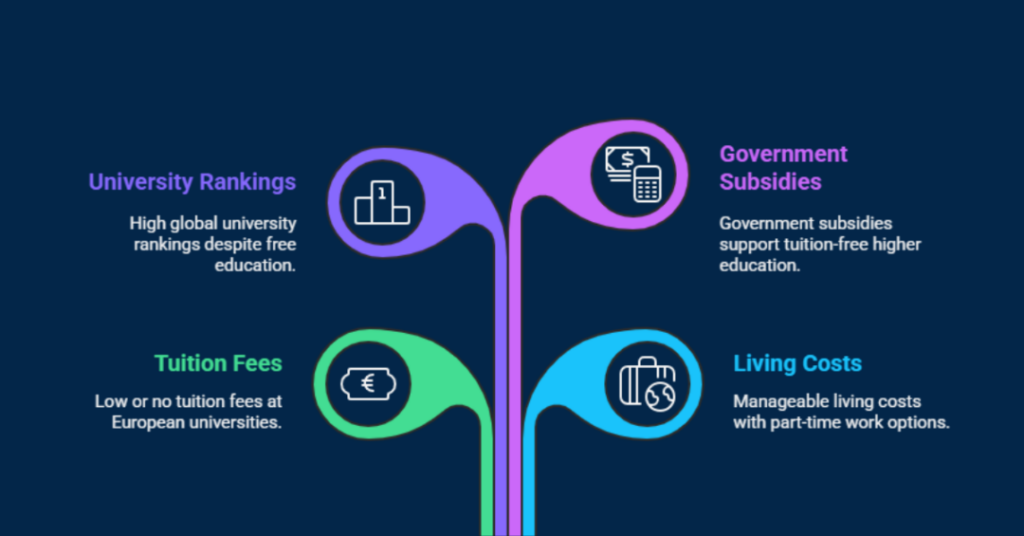9 September 2025
6 minutes read
How To Study Abroad For Free In Europe As An Indian Student: 6 Secret Ways

Key Takeaways
- Learn how to study abroad for free in Europe by targeting tuition-free public universities in countries like Germany, Norway, and France
- Compare costs wisely since tuition fees in Europe are often less than ₹1 lakh per year versus ₹30–40 lakhs in the US or UK
- Use scholarships and low tuition at public universities in Finland, Austria, and Italy to cut costs further
Back in 2014, Germany scrapped tuition fees at its public universities, and since then international students, including Indians, pay nothing for higher education except a semester contribution of about €250.
Norway funds education through its oil revenues, which is why students study tuition-free, while Finland and Austria keep fees as low as €1,000–2,000 a year.
Compare that with the US or UK, where tuition alone often crosses ₹30–40 lakhs, and you’ll understand why I tell students to stop ignoring Europe. The truth is, several European governments believe higher education is a public good, not a business, and that’s exactly why smart Indian students are getting world-class degrees here almost free of cost.
Is It Worth Studying In Europe In 2025?
I’ll go deeper in here, but the shorter answer is YES. Because Europe is the only region where an international student can still get higher education without being robbed blind.

While your friends brag about paying ₹40 lakhs a year in tuition fees in the UK, you could quietly study abroad for free at public universities in European countries that actually believe education is a right, not a luxury product. And no, I am no way lying to you. It’s policy.
- In Germany, international students pay only a semester contribution of €250–300, while in Norway, public universities offer free tuition even to non-EU students.
- Several countries like Austria and Finland charge such low tuition fees that the annual cost is less than what many students pay for coaching classes in India.
- Many universities in Europe offer tuition-free education because governments subsidize higher education from tax revenues instead of treating it like a business.
- Unlike the US or UK, where students pay massive tuition fees, in Europe the focus is on keeping living costs manageable, and many countries even allow part-time work.
- If you want to study abroad smartly, Europe is the only place where several countries are offering free education in 2025 while still ranking high in global university rankings.
6 Secret Ways To Study Abroad For Free In Europe
Nothing is free, to be honest. Everything has some cost, whether it’s your effort in applications or the patience to figure out visa rules. But, in Europe, many countries offer tuition-free education at public universities, which means you don’t have to pay tuition fees the way you would do to study in the US or UK.
Instead, you can study for free or at costs so low they feel almost symbolic. I’ve helped students unlock these opportunities, and the truth is simple, if you know the right strategies, Europe becomes the smartest way to study abroad without burning through your family’s savings.
1. Target Public Universities In Germany That Abolished Tuition Fees
As they said in Inception, “You mustn’t be afraid to dream a little bigger, darling.” Germany turned that dream into reality when it scrapped tuition fees in 2014. Many of my students who got into public universities in Germany, paying only €250–350 per semester as a contribution fee.
Compare that with ₹30–40 lakhs in the UK, and you’ll see why German universities remain the smartest way to study in Europe for free.
2. Look Beyond the Obvious
Norway offers free education to non-EU international students, and a lot of students from India go through their entire degree without paying a single euro in tuition.
Finland works differently: Finnish universities do charge tuition fees for international students, but I’ve helped students secure full waivers through scholarships, bringing the cost down to under €2,000 a year. That’s cheaper than what many pay for a year at private universities in India.
3. Don’t Overlook France and Italy’s Public Universities
In my experience, not a lot of people know about this, but public universities in France charge as low as €170 a year, even for international students from outside the EU. A few in my network, who are now studying there, spend less on tuition fees than on their monthly café bills in Delhi. Public universities in Italy are equally affordable, where students may pay around €1,000 annually for world-class higher education.
4. Study in English Without Paying Extra Tuition Fees
I often hear, “But I don’t know German or French.” The truth is, students can study in English for free at many tuition-free universities across Europe. From universities in Finland to German universities and even free universities like Charles University in the Czech Republic, you can still study for free in Europe without a language barrier.
5. Use Countries That Offer Free or Low-Cost Education as a Gateway
Many European countries use free higher education to attract international talent. Sweden, for instance, offers full tuition waivers to EU students and scholarships to non-EU international students. I’ve seen graduates leverage this as a way to study and later transition into careers in Europe.
6. Scholarships + Part-Time Work = Free Education Abroad in Practice
Even with tuition-free education at public universities, living costs remain. But students at public universities are allowed to work part-time, earning up to €1,200 a month. Combine this with scholarships from finnish universities or public universities in France, and suddenly students can study for free in Europe without financial strain.
How To Get A Scholarship To Study In Europe For Free Education?
While the US and UK make you bleed with sky-high tuition fees for international students, Europe has governments that believe education is free and should remain so. That’s why public universities in Germany, Finnish universities, and even public universities in France have built systems where students can study for free in Europe or at least pay peanuts compared to private universities.
We’ve spent years researching how students crack these opportunities, and the real game isn’t just applying; it’s knowing how to use scholarships as a way to study in Europe for free without the burden of tuition.
1. Governments Subsidize Tuition at Public Universities
Unlike the US, where universities charge whatever they like, tuition-free education at public universities in Europe exists because governments fund them directly. German universities, universities in Finland, and even public universities in Italy rely on subsidies, which means students may only pay €200–€1,000 per year. Scholarships stack on top of this, so non-EU international students can reduce the cost of studying abroad to almost nothing.
2. Scholarships Designed Specifically for Non-EU Students
Most countries like Germany, France, and Norway know that attracting non-EU students boosts their economy. That’s why Norway offers free education outright, while Sweden offers free education to EU citizens but also scholarships for international students from outside Europe. I’ve seen full tuition waivers offered by Finnish universities to Indians who never expected free education abroad could be real.
3. Study in English for Free (Yes, Really)
My hack that I tell everyone is that students can study in English for free across dozens of programs in Europe. Tuition-free universities and free universities like Charles University in the Czech Republic or public universities in France charge almost nothing for programs fully taught in English. This is the chance to study in English for free without compromising on quality at top universities.
4. Europe Uses Scholarships to Attract Global Talent
When you see that European countries offer free tuition, don’t think it’s charity. It’s strategy. Scholarships are the bait to bring ambitious students in. Countries offer tuition-free education because they want skilled graduates to stay back. That’s why offers free education at public universities come bundled with post-study work opportunities. I’ve watched students studying abroad but worried about costs turn this into a career move.
5. Combining Work Rights With Scholarships = Zero Net Cost
Even when students at public universities get tuition waived, living costs remain. This is where Europe plays smart. Most students work part-time, which may earn them €800–€1,200 monthly.
Add that to merit scholarships offered by Finnish universities or bursaries from public universities in France, and suddenly, students can study for free in Europe while covering rent and food. That’s how many European countries make free higher education not just a promise, but a reality.
Conclusion
If there’s one thing I’ve learned after years of guiding students, it’s this that the countries in Europe that offer tuition-free education aren’t doing charity; they’re investing in talent. And that’s where Indian students have the biggest opportunity.
Instead of drowning in debt for a degree in the US or UK, you can use public universities in Germany, France, or Finland to build the same career foundation at a fraction of the cost.
I can help you with applications, scholarships, and visas so you can study in Europe for free or at low cost. No confusion, no wasted time, just a clear path to secure your place and achieve your international education goals. Book a 1-Hour call with our expert for absolutely free.
FAQs
Which European countries offer free tuition to international students?
Germany, Norway, and Austria provide tuition-free or very low-cost education at most public universities for international students.
Are scholarships available for studying in Europe?
Yes, organizations like Erasmus+ and universities themselves offer scholarships to help cover tuition and living costs.
Do I need to speak the local language to study for free?
Some countries like Germany and the Czech Republic require students to study in the national language for free education.
Are living expenses covered if tuition is free?
Typically, students must pay for living expenses, but some scholarships include allowances for accommodation and meals.
Can non-EU/EEA students study for free in Europe?
Germany and Norway offer free tuition to all students, regardless of nationality, while others limit free tuition to EU/EEA students.
Which degree levels can I study for free in Europe?
Free or low-cost tuition is often available at both undergraduate and postgraduate levels, depending on the country and university.

You can study at top universities worldwide!
Get expert tips and tricks to get into top universities with a free expert session.
Book Your Free 30-Minute Session Now! Book a call now




























